
Cancer Control
Scope & Guideline
Transforming insights into impactful cancer solutions.
Introduction
Aims and Scopes
- Cancer Epidemiology and Prevention:
Focus on understanding cancer incidence, risk factors, and prevention strategies across different populations, including studies on vaccination uptake and socio-economic disparities. - Clinical Trials and Therapeutics:
Investigation of new therapies and treatment protocols through clinical trials, including immunotherapy, chemotherapy, and novel drug combinations. - Biomarkers and Prognostic Models:
Research on identifying and validating biomarkers for cancer diagnosis, prognosis, and treatment efficacy. This includes the development of nomograms and predictive models. - Health Disparities and Access to Care:
Exploration of disparities in cancer care and outcomes among different demographic groups, emphasizing the need for equitable access to health services. - Patient-Centered Care and Quality of Life:
Studies aimed at understanding the impact of cancer and its treatment on patients' quality of life, including psychosocial factors and survivorship issues. - Technological Innovations in Cancer Research:
Application of advanced technologies, such as machine learning, AI, and bioinformatics, to improve cancer diagnosis, treatment planning, and patient outcomes.
Trending and Emerging
- Integrative Approaches to Cancer Treatment:
Research increasingly emphasizes the integration of multiple treatment modalities, including combining immunotherapy with traditional therapies, reflecting a shift towards comprehensive care models. - Health Equity and Social Determinants of Health:
There is a growing focus on addressing health disparities and understanding how social determinants influence cancer outcomes, leading to more targeted interventions in underserved populations. - Use of AI and Machine Learning:
The application of artificial intelligence and machine learning in predicting cancer outcomes and personalizing treatment is gaining traction, showcasing the journal's commitment to embracing technological advancements. - Patient Engagement and Decision-Making:
Emerging studies are focusing on involving patients in their treatment decisions and understanding their preferences, which aligns with a trend towards patient-centered care. - Longitudinal Studies and Survivorship Research:
There is an increasing emphasis on long-term outcomes and survivorship, including the psychological and physical impacts of cancer treatment, indicating a shift towards understanding the full patient journey.
Declining or Waning
- Traditional Chemotherapy Approaches:
Research focused solely on conventional chemotherapy without integrating newer therapeutic modalities or personalized medicine has declined, as the field shifts towards more targeted and individualized treatment strategies. - Basic Science Research:
There appears to be a waning interest in purely basic science studies that do not directly translate into clinical applications, as the journal increasingly emphasizes translational research. - Narrowly Focused Regional Studies:
Studies that focus exclusively on specific regions without broader implications or comparisons have decreased, indicating a shift towards more globally relevant research. - Single-Disease Focus:
The trend of focusing exclusively on one type of cancer in isolation is declining as there is a growing recognition of the need for a more integrated approach considering multiple cancer types and their interactions. - Historical Data Analysis:
While historical trends remain relevant, there is a decreasing emphasis on analyses that do not incorporate contemporary data or innovative methodologies, reflecting a shift towards more current and actionable insights.
Similar Journals

Breast Cancer
Bridging research and practice for a cancer-free future.Breast Cancer is a prestigious peer-reviewed journal published by SPRINGER JAPAN KK, specializing in the multifaceted domains of oncology and medical pharmacology. With an impressive impact factor and recognized within the Q1 category in multiple areas, including Medicine (miscellaneous), Radiology, and Nuclear Medicine and Imaging, this journal serves as a fundamental resource for cutting-edge research and clinical advancements in breast cancer treatment and care. Its indexed presence in renowned databases like Scopus further affirms its significance, ranking 56th in Radiology and 60th in Pharmacology. The journal aims to bridge the gap between clinical practice and scientific research by publishing original articles, reviews, and case studies that enhance understanding and improve patient outcomes. With converged content available from 1994 to 2024, the journal is dedicated to fostering innovative research while engaging a global audience of researchers, clinicians, and students passionate about tackling breast cancer challenges.
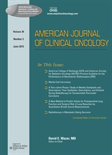
AMERICAN JOURNAL OF CLINICAL ONCOLOGY-CANCER CLINICAL TRIALS
Transforming Cancer Treatment with Cutting-Edge ResearchAMERICAN JOURNAL OF CLINICAL ONCOLOGY-CANCER CLINICAL TRIALS, published by Lippincott Williams & Wilkins, is a pivotal journal in the fields of oncology and cancer research, focusing on the latest advancements in clinical trials and therapeutic strategies for cancer management. With an ISSN of 0277-3732 and an E-ISSN of 1537-453X, this journal serves as an essential resource for the dissemination of high-quality research findings, scholarly reviews, and innovative methodologies, aiming to advance clinical oncology from 1982 to 2024. It is categorized in Q3 for Cancer Research and Q2 for Oncology, reflecting its significant role in the scientific community. In addition to its rigorous peer-reviewed content, the journal provides a platform for researchers and clinicians to share valuable insights, laying the groundwork for future breakthroughs in cancer treatment. Although it currently does not offer open-access options, the journal remains accessible to a wide audience through academic institutions and libraries. The AMERICAN JOURNAL OF CLINICAL ONCOLOGY is crucial for anyone involved in oncology research, making it a must-read for professionals dedicated to improving cancer care.
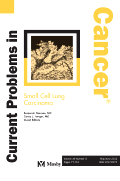
CURRENT PROBLEMS IN CANCER
Empowering Solutions: Focusing on Today’s Cancer ChallengesCURRENT PROBLEMS IN CANCER is an esteemed journal published by MOSBY-ELSEVIER, dedicated to advancing the field of oncology and cancer research. With an ISSN of 0147-0272 and an E-ISSN of 1535-6345, it has been a vital resource for over four decades, converging years of expertise from 1976 to 2024. The journal is recognized for its impactful contribution to the field, currently holding a Q3 ranking in Cancer Research and a Q2 ranking in Oncology, reflecting its importance in disseminating significant advancements and discussions in the field. It is ranked #164 out of 404 in Medicine _ Oncology and #131 out of 230 in Biochemistry, Genetics and Molecular Biology _ Cancer Research on Scopus, indicating its relevance and reach among academic circles. Although it does not offer open access, the journal remains a crucial platform for researchers and professionals seeking to explore contemporary issues in cancer treatment and management. With its commitment to quality and innovation, CURRENT PROBLEMS IN CANCER serves as an essential conduit for knowledge sharing and research development in oncology and cancer science.

Current Oncology
Innovative Insights for Oncology ProfessionalsCurrent Oncology is a prominent open-access journal dedicated to the field of oncology, published by MDPI in Switzerland. With an ISSN of 1198-0052 and E-ISSN 1718-7729, this esteemed journal has been providing valuable insights since its inception in 1998 and continues to publish cutting-edge research through 2024. Recognized for its contribution to the medical community, Current Oncology holds a 2023 Q2 category rank in Oncology and is positioned at the 41st percentile among its peers in Scopus rankings. As a hub for innovation and discussion in cancer research, it offers a plethora of articles that span various aspects of oncology, making it an essential resource for researchers, professionals, and students alike. Since becoming fully open-access in 2006, it provides expanded accessibility to groundbreaking studies and findings, fostering collaboration and knowledge exchange across the global research community. With its central location in Basel, Switzerland, Current Oncology plays a pivotal role in advancing oncology's frontiers.

CANCER
Unveiling breakthroughs in oncology since 1948.CANCER, published by Wiley, stands as a pivotal journal in the field of oncology and cancer research, boasting an impressive impact factor and consistently dynamic growth since its inception in 1948. With an ISSN of 0008-543X and an E-ISSN of 1097-0142, this esteemed journal is recognized for its rigorous peer-reviewed articles, making significant contributions to the understanding of cancer biology, treatment modalities, and clinical practices. CANCER holds a distinguished position in the academic community, securing its placement in the Q1 category for both cancer research and oncology, and ranks within the top percentiles on Scopus, indicating its high impact and relevance. The journal is particularly beneficial for researchers, professionals, and students seeking to stay abreast of the latest advancements in cancer science. By addressing essential research questions and providing pathways for new therapies, CANCER continues to play a crucial role in shaping the future of oncology and improving patient outcomes.

Journal of Cancer Policy
Shaping the future of oncology with strategic insights.Journal of Cancer Policy is an esteemed publication devoted to the critical intersection of health policy and oncology. Published by Elsevier Sci Ltd in the United Kingdom, this journal has been a pivotal platform since its inception in 2013, contributing to the field's discourse on cancer management and policy-making strategies. With an impressive Q2 ranking in both the Health Policy and Oncology categories for 2023, it underscores its significance in shaping policy frameworks that address the complexities of cancer care. The journal is listed in Scopus with a respectable rank of #177 in Health Policy and #261 in Oncology, indicating its broad reach and impactful contributions to research and scholarly discussions. While the journal operates under a subscription model, it aims to provide readers with high-quality research that can influence health decisions and policy formation. As a vital resource for researchers, healthcare professionals, and students alike, the Journal of Cancer Policy plays a fundamental role in advancing the understanding of how policies can improve cancer outcomes and healthcare systems.
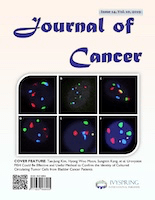
Journal of Cancer
Connecting researchers to transform cancer care.Journal of Cancer is a premier, peer-reviewed academic journal published by IVYSPRING INTERNATIONAL PUBLISHING that focuses on advancing the field of oncology. With an impact factor reflecting its significant contributions, this journal ranks in the 80th percentile of medical journals pertaining to oncology, positioning it at #79 out of 404 in Scopus. Since its inception in 2010, the journal has embraced an Open Access model, ensuring that groundbreaking research reaches a global audience without barriers. Based in Australia, the journal addresses a wide array of topics within cancer research, catering to researchers, healthcare professionals, and students committed to enhancing their understanding of the complexities of cancer. Amidst evolving challenges in oncology, the Journal of Cancer serves as a vital platform for disseminating innovative findings, fostering collaboration, and promoting informed decisions that can lead to improved cancer outcomes worldwide.
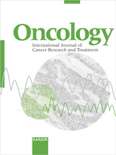
ONCOLOGY
Advancing cancer research through impactful insights.ONCOLOGY is a prestigious journal published by KARGER, dedicated to advancing the field of cancer research and treatment. Established in 1948, this peer-reviewed journal has established a significant presence in the medical community, reflected by its impressive impact factor and Q2 category rankings in both Cancer Research and Oncology as of 2023. With a focus on groundbreaking research and comprehensive reviews, ONCOLOGY serves as a crucial resource for researchers, clinicians, and students interested in the latest developments in the fight against cancer. Although it currently does not offer open access, the journal's reputation ensures that it reaches a wide audience in academia and clinical practice. Its commitment to excellence is underscored by its consistent rankings in key disciplines, making it a vital publication for anyone involved in cancer research, biology, or associated medical fields. The journal is headquartered in Basel, Switzerland, positioning it at the heart of European medical research.
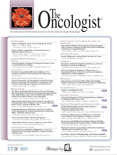
ONCOLOGIST
Shaping the future of cancer care through open access.ONCOLOGIST is a premier, open-access journal published by Oxford University Press, advancing the field of cancer research since its inception in 1996. With an impressive H-Index and a prestigious placement within the Q1 category in Cancer Research, Medicine, and Oncology for 2023, ONCOLOGIST stands at the forefront of oncological science, boasting a Scopus rank of #55 out of 404 in Medicine and #47 out of 230 in Cancer Research. This journal not only disseminates cutting-edge research but also aims to foster multidisciplinary approaches that are critical for addressing the complex challenges faced in cancer therapy and survivorship. Be part of a vibrant community as you explore impactful research articles that contribute to the global conversation on cancer. ONCOLOGIST is dedicated to providing an accessible platform for authors and readers alike, ensuring that high-quality research is available to all stakeholders in the fight against cancer.

International Journal of Cancer Management
Advancing cancer care through innovative research.The International Journal of Cancer Management is a distinguished publication dedicated to advancing knowledge and research in the fields of cancer management, oncology, pharmacology, and radiology. Published by BRIEFLAND in the Netherlands, this journal serves as a vital resource for researchers, healthcare professionals, and students interested in the latest developments in cancer care and treatment strategies. With an ISSN of 2538-4422 and an E-ISSN of 2538-497X, the journal features a range of peer-reviewed articles that cover diverse aspects of cancer management, reflecting its commitment to high-quality, impactful research. The journal ranks in the Q4 category for Cancer Research and Oncology and Q3 for both Pharmacology and Surgery in 2023, signifying its growing influence in the scientific community. Through its open access format, the International Journal of Cancer Management ensures that critical research findings are accessible to all, promoting collaboration and innovation in the battle against cancer. Researchers looking to share their findings or learn more about current trends will find this journal an invaluable addition to their professional toolkit.